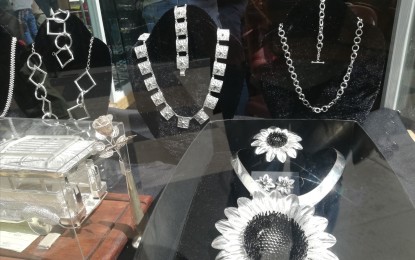
LOCAL PRIDE. Some of the hand-crafted silver items displayed at the Pilak Silver Shop located in front of the Botanical Garden in Baguio City. Artisans who transform silver into intricately-designed items and jewelries are sustaining Baguio’s silver craft industry amid the proliferation of imported machine-made items. (PNA photo by Liza T. Agoot)
BAGUIO CITY – Over 40 years in the business of hand-crafted silver and sustaining one of the things this city is known for have become the driving force of Pilak Silver Shop amid challenges.
Rommel Marcelo, the 47-year-old manager of the family-owned business, said the craft shop is the lone surviving homegrown brand that creates its own designs.
“Baguio’s silver craft is generational, from the grandparents, to parents, and then to the children who soon dip their hands into the business in preparation for their eventual management,” Marcelo said.
The Pilak Silver Shop traces its roots in the mid-70s, when Marcelo's parents, Romeo and Preciosa, opened the Aloha Souvenir Shop at Mines View Park.
In 1977, the couple discovered the potential of silver as a jewelry line of business, and shifted to everything silver, eventually changing the shop’s name to Pilak, the Filipino word for silver.
In an interview with the Philippine News Agency in 2018, Preciosa said former First Lady Imelda Marcos helped promote Baguio’s silver products to foreign countries through the National Cottage Industry Development Authority.
In the past years, Marcelo said the city’s silver craft industry went through challenges, especially the competition with imported machine-made items that are much cheaper.
But instead of giving up, the younger Marcelo accepted their limitations in terms of handcrafting and invested in the strengths that kept them going -- the skills of the artisans who transformed silver into works of art.
“When all seemed hopeless due to the emergence of imported machine-made silver that took the silver market by storm, we continued. We know that some of our works cannot be replicated by machine, so we concentrated on those works and placed them up front in our product presentation, with the end goal and hope that the market would continue to appreciate our works Fortunately, it did and it helped us sustain the craft, and our livelihood,” he said.
“Saying enough, let us close, is not as easy as it seems, especially if your workers have become part of the family, and you know that their enthusiasm continues to grow,” he added.
With only Pilak having a physical store that makes designs using locally mined silver metals, and with local talents expressing themselves through their classic designs, the number of artisans working for Pilak grew from 15 pre-pandemic to the current 40.
“It was surprising that after the pandemic, the number of our crafters grew to 40. A lot of them are home-based, especially the older ones who continue to display their artistry through us,” Marcelo said.
He said the oldest crafter for Pilak is about 80 years old, while most are in their 60s and 50s.
Five of them go on duty at the workshop and allow visitors to see the actual process of hand-crafting silver.
“There are small handcrafters who continue to share their talents and whose interest in creating handcrafted items never waned, which was the reason we never closed shop amid the many challenges. The talent is becoming scarce with few getting into the business and existing ones closing or shifting to imported machine-made items. But Baguio being known for handcrafted silver is a continuing driving force that makes us continue to provide a venue to showcase the products of the crafters,” he said.
Moving forward
Taking after his father’s artistic talent and his mother’s entrepreneurial skills, aside from actually helping out in the shop as a little boy together with his older sister, Marcelo is now in command of Pilak.
“I design and delegate the desired output to the crafters, knowing fully well their expertise and capabilities. During product prototyping, it is usually a back-and-forth of ideas and approaches until we come up with the final design. Pure collaboration between me and the crafters,” he said.
Marcelo said managing the shop has always been his full-time job since he graduated from a Management course, eventually moving to overall management and going into product development and prototyping.
He said Baguio’s inclusion as a United Nations Educational, Scientific and Cultural Organization site for Arts and Crafts, with hand-crafted silver inluded, is also helping Pilak sustain the city’s silver craft industry.
Marcelo said the hand-woven fabric industry in the Cordillera is eyeing the inclusion of silver in their wearables, providing another opportunity for the hand-crafted silver to live on. (PNA)
